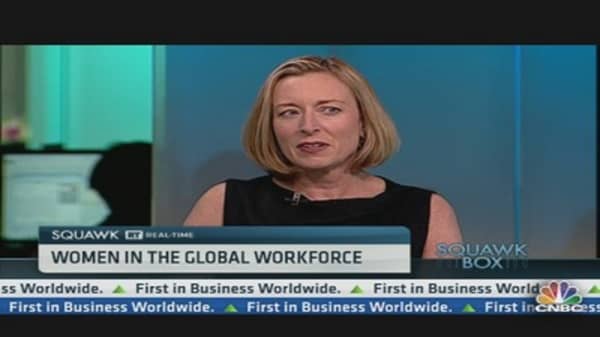They say it is a man's world, but perhaps not for much longer as up to one billion women are expected to enter the workplace in the next decade, according to the latest survey from Booz and Co. on women in the workplace.
The report from the global management and strategy consultancy said the surge in women employees, employers, producers, and entrepreneurs in the next 10 years would improve not only gender equality, but global economic growth — however, it also warned that governments could miss out on this potential.
"As the world economy grows and develops, countries cannot afford to ignore over 50 percent of their talent pool, " Penney Frohling, business strategist and partner at Booz and Co., told CNBC. "There is a view that countries that are able to tap into that talent pool are going to see higher growth. There is a very clear correlation between empowering women and GDP growth , literacy rates, infant mortality rates."
She added: "[Any] countries that don't tap into that are going to fall further and further behind."
Booz & Co. created an index that ranks 128 countries based on how effectively leaders are empowering women as economic agents, looking at factors such as access to education, market participation, and anti-discrimination policies — such as those introduced by Norway that require at least 40 percent of board members in publicly listed companies to be women.
Penney Frohling told CNBC Europe's "Squawk Box" on Monday that such policies are an "emotive issue."
"When you see a [government] quota, you are looking at a long history of not achieving any progress in key performance indicators, " she said. "A quota is never a starting point — it's a point where people feel there is a need for a catalyst."
Though some countries have introduced policies of positive discrimination to ensure that women are reaching the highest rung of the ladder, there are flaws in the policy. The British government said that by 2015 at least 25 percent of company boards should be made up of women, yet there is a long way to go, Frohling said.
"In the U.K., there is a statistic that [shows] that out of 950 "C-suite" level positions (corporate executives) 70 of them are occupied by women. We simply are not making progress as quickly as we could, " she said.
Childcare is also a big issue for women in their career progression, as is gender equality in the workplace, Frohling said, with the U.S. making an "interesting" statistic.
"In the U.S … there are women living hand-to-mouth in low-waged jobs and 41 percent of their salaries are taken over by childcare costs — so there's really no way of getting ahead when you're facing those kind of [obstacles], " she said.
Despite calls from the International Monetary Fund and the Organization for Economic Co-operation and Development for governments to invest in women, there are still many boundaries to women progressing in the developing world's labor force.
Alluding to the high-profile Taliban shooting of teenager Malala Yousafzai in Pakistan after the 14-year old campaigned for female education, Frohling said that basic rights such as access to property and education were key in female empowerment.
"It starts with education and access to education, " Frohling said. "You need a basic infrastructure in place. … Once you have that infrastructure in place to get women into the workforce."
—By CNBC's Holly Ellyatt





